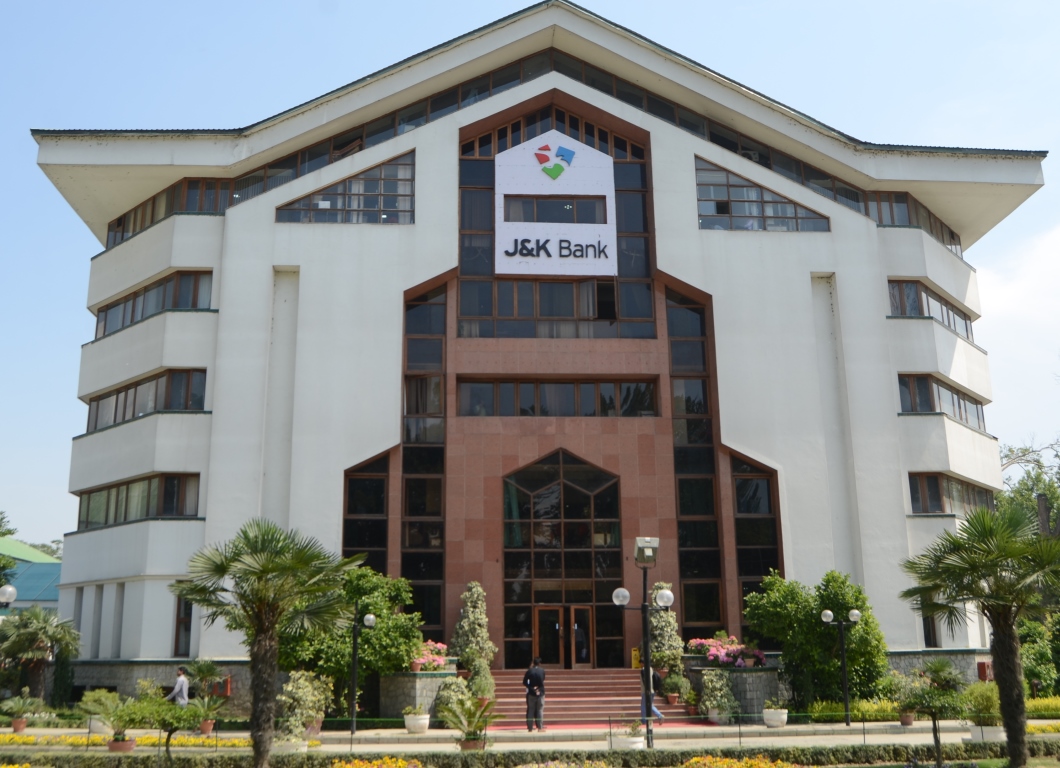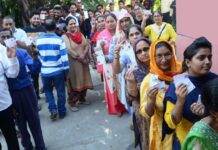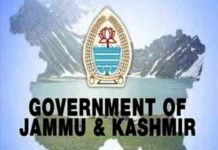SRINAGAR: A delegation of members of the Kashmir Chamber of Commerce and Industry has listed the key demands with an adviser to Lt Governor. They highlighted the crisis of the economically vulnerable sections of the society who were pushed into a new crisis by the lockdown. They appreciated the government’s Covid19 management and extended all support to the efforts to contain the virus.
Javed Tenga, former President of the Kashmir Chamber of Commerce and Industry led the delegation to Baseer Khan that comprised Nasir Hamid Khan, Faiz Bakshi, Ashaq Shangloo, Wahid Malik, Umar Nazir Tibetbaqal, Lateef A Bhat and Majid Aslam Wafai.
The delegation drew the attention of the Government towards the plight of the vulnerable sections of the handicrafts sector and fervently appealed that cash assistance of at least Rs 5,000/per month be provided to them as also to other weaker sections of the economy including shikarawallahs, transporters, daily wagers and others to tide over the present situation.
They also raised the issue of the private sector who had to pay huge salaries to their employees without being able to operate their business. Giving examples of interventions given all over the world where Governments had stepped in and provided in some cases even up to 80 per cent of the salaries to the private business enterprises he urged the Government to consider subsidising up to 50 per cent of the salary expenditure.
The Memorandum submitted for the consideration of the Government contains the following points:

Whereas the Kashmir Chamber of Commerce and Industry has put on record losses to the tune of thousands of crores suffered by the local business community over the previous years and in this regard the Government of Jammu and Kashmir as well as the Central Government has been making efforts towards salvaging our economy by announcing several interventions and relief measures during this period;
The special focus of the Government on our tourism sector with the active participation of the stakeholders resulted in a remarkable increase in the inflow of tourists during the winter months of 2020-21 right up to the beginning of April 2021;
Most of us remember how after taking over as the Lt Governor of Jammu and Kashmir, Manoj Sinha had immediately constituted a Committee for Relief and Revival of Business Sector in August 2020. After detailed deliberations with stakeholders across the board, the Committee had submitted comprehensive proposals which were systematically addressed and most of the problems and issues facing the business community at that point of time were resolved within an unprecedentedly short period of time through a special package announced on the 19th of September, 2020.
With the view of boosting of our economy, several other measures have also been taken up. Special mention needs to be made of the following important interventions:
- Timely Release of 3rd instalment of Interest Subvention amounting to Rs 250 Cr part of the Rs 1353 Cr package announced in September 2020 providing relief to 3.44 lakh borrowers;
- Cash assistance of Rs 2.94 Crores for the most vulnerable sections of the tourism industry including shikara owners, tourist guides and ponywalla
- Introduction of the New Central Sector Scheme for Industrial Development of Jammu & Kashmir 2021‐37;
- Setting up of Single Window Portal for online clearances and other ease of doing business measures;
- Operationalisation of Local and MSME filters on GeM enabling all departments in J&K to procure goods and services from the local manufacturers.
However, it is an established fact that all economic interventions critically hinge on the assumption that there will be better business conditions in the near future. The second wave of the Covid-19 pandemic has prevented such a scenario. Economic activities have come to a grinding halt since ending April and the fight against controlling the virus appears to be a continuous process.
Despite the Lt Governor announcing that the fight against Covid would go side by side with tourism and economic development, the severity of the pandemic has ensured that this noble intention is put on hold.
The memorandum that the trade deposited with the adviser is a long document, passes of which are reproduced in detail.
We are much encouraged by the pragmatic messages emanating from the Raj Bhawan with regard to the fight against Covid being a joint responsibility of all stakeholders and the need to join hands for the eradication of this menace.

Before we raise the economic issues, we would like to appreciate the timely action taken by the Government in controlling the Covid-19 pandemic in Kashmir by announcing a lockdown and augmenting the health and medical infrastructure on war footing. In this fight, many of the dedicated Corona warriors especially doctors, medical staff, bank employees, health workers have sacrificed their lives while discharging their duties, for which we shall be eternally indebted to them. In this regard, we would specially like to mention late Shamim Ahmad Wani, Special Secretary Finance who had carved a special place in the hearts of all because of his dedication and professionalism. His contribution towards the cause of trade, commerce and industry of Jammu and Kashmir shall always be remembered and his loss has created a vacuum, which may never be filled.

There are concerns about the supply of oxygen and vaccines which appear to have been to be addressed. In this regard, the receipt of seven oxygen generation plants from Germany and the reported augmentation of oxygen from 15,000 LPM on 1st April to 50,000 LPM today is a welcome step as are the reports of receipt of fresh consignment of vaccines.
The constitution of a Special Task Force under the Chairmanship of renowned gastroenterologist Dr M S Khuroo for the formulation of an Äction Plan” to tackle a possible 3rd wave of Covid is also a step in the right direction.
At this point in time, we submit the following suggestions seeking very specific interventions which in our opinion would help in limiting permanent damage to our economy for your kind consideration:
Finance & Banking
In view of the continuous stress on borrowers of the Bank, the Government may consider revisiting the Interest Subvention scheme which has been much appreciated by all the sectors of the economy. In this regard, we would suggest that an amount of Rs 950 Cr may additionally be earmarked for this purpose for disbursement on the same pattern. This would help the borrowers to tide over the present crisis.

In view of the grave situation prevailing in the Valley, we suggest that all punitive actions by financial institutions especially under the SARFAESI Act be put on hold for the time being.
Weak and vulnerable sections belonging to all economic sectors like daily wagers, small traders, labourers, street vendors and hawkers, bus drivers and conductors, autorikshaw drivers, tourist taxi drivers need to help due to their inability to earn a living. The Government may consider devising a mechanism for providing cash assistance to these sections which needs to be over and above the minimum wages prescribed. We suggest monthly assistance of Rs 5,000/-
Handicrafts:
The Handicrafts Sector of Kashmir could receive a huge boost if the Central
The government would reserve a minor percentage of Central Government purchases as well as urge other State Governments throughout the country for the purchase Kashmiri Handicraft products including Shawls and Carpets, office furniture and interiors, stationery, etc. There is little hope for this traditional sector of ours other than the Government adopting Brand Kashmir.
Similarly, the Government of Jammu and Kashmir may consider activating the Government Arts Emporium which has assets all over the country for directly purchasing handicraft products directly from our artisans and weavers and aggressively marketing the same throughout the country. As you would be aware, the traditional global markets for these products are mostly under lockdown which reflects adversely on the exports sector.
There is a demand for raising the cap on drawbacks on the exports of Pashmina Shawls because of it’s high basic cost and value addition factor. Also the rate of GST on handmade/hand-‐embroidered Shawls upto Rs 1000/- is 5% where above that the GST rate has been fixed at 12%. The Government is requested to reduce the slab to a uniform 5% for all handmade/hand-‐embroidered Shawls.
Till the time a viable solution is arrived at, the artisans and weavers of this important cultural and economic sector of ours need assistance in the shape on reasonable monthly remittances, as has already been announced for the vulnerable sections of the tourism sector.
Industry
The new Industrial Policy provides little relief for the existing and sick unitholders. In the present situation, it is the existing and viable sick unitholders who can help in reviving the economy as they comprise of local stakeholders well versed with the local conditions.
The waiver of fixed electricity demand charges and other Government rentals and fees would also be vital support mechanism for the local stakeholders.
Tourism
Our tourism sector is perhaps the most vulnerable economic sector and needs special attention. The increase in tourist inflow during the winter months led to further investments by the stakeholders and created a lot of employment as well. However, the abrupt cessation of the inflow has left this sector reeling and created intensive job losses.
There is a justified demand from the tourism sector to be given benefits at par with the Industrial Sector including electricity rates being charged.
For the Hotel sector, it is suggested that the fixed demand charges for the Covid period may be waived off and electricity charges be restricted to actual consumption.
Similarly, water charges which is being charged on commercial rates and is a big drain on the establishments in the absence of any business may also be waived off.
The registrations of Hotels, Restaurants and Houseboats which have lapsed on the 31st of March, 2021 with the Department of Tourism, Municipal Corporation and other Departments may be automatically renewed/extended for a period of one year i.e the 31st of March, 2022.
It is suggested that Municipal Taxes, Licence Fee and other charges may be waived off for the current year.
It is also suggested that the cash assistance be extended to Houseboat owners, Travel Agents/Tour Operators also.
General Trade:
The general trade sector requires extension in the filing of GST returns which needs to be taken up with the GST Council. With regard to the continuous closure of business establishments, we suggest that the fixed demand charges be waived off for the period of lockdowns and electricity be charged as per actual usage.
Regarding the loan accounts of traders, we urge a special rehabilitation/restructuring facility as has been done for the MSME sector which would enable them to keep their accounts regularly and their businesses operational.
With regard to the regulation of operation timing for essential goods including vegetable, fruit meat/chicken vendors and grocery/provision stores, that after observing the situation and consulting with experts it is submitted that a huge number of people are forced to visit these shops for purchase of essential items every day and consequently COVID appropriate protocols are not followed. It is also difficult for the vendors to receive supplies, settle accounts and other logistical problems arise. It is submitted that these shops/vendors may be allowed to be open round the clock so that the rush is reduced to a minimum. It is also necessary to ensure a safe corridor for the movement of goods as also encouraging the culture of home deliveries which would save the goods from getting expired and also generate revenue for the Government by way of taxes. The closure of departmental stores/supermarkets would create a huge inventory of dead stocks which can be avoided by allowing them to operate their units for home deliveries only.
The Government had allowed these activities last year as well. This step would also help in keeping a majority of the population indoors as was done last year. We have reports of dealers of essential food products/FMCG facing difficulties in getting supplies because of the Corona Curfew.
Horticulture:
The recent hailstorms have caused extensive crop damage all over the Valley. Loss assessments carried out by the Government has estimated the damage to be up to 40 per cent in many districts like Kulgam and Handwara but there has been further damaged by hailstorms coming after the estimates were compiled. The farmers and orchardists do not have the protection of the Prime Ministers Crop Insurance Scheme in Kashmir and earlier also the Government had stepped in by disbursing an amount in excess of Rs 200 Crores after the crops were damaged due to heavy snowfall in the year 2018. A similar intervention is required.
With the Cherry and strawberry season having started and these crops being highly perishable, it is suggested that a viable corridor be arranged for transportation of these fruits to domestic markets outside Kashmir. When faced with a similar situation last year, the Government had intervened and announced 50% subsidy on a air freight for these perishable fruits. An announcement on the same pattern is required.
Haj & Umrah Operators
Our Haj and Umrah Operators is facing it’s second year of doing absolutely no business due to the Covid related travel bans and restrictions. This has resulted in many of the companies coming under tremendous stress. The Interest Subvention for this sector needs to be over and above the general rate of 5% and the Government may consider subsidising their establishment /salary expenses to the tune of 50%.
Transport
The September 2020 revival package had announced several measures for the transport sector including relief to Bus Drivers/Cleaners/Sumo and Auto Drivers to the tune of Rs 80 Cr, 50% subsidy for replacement of old buses for Rs 25 Cr, 50 Cr for providing of insurance cover. Similar measures on a larger scale need to be introduced for this year also as this sector is in a worse condition than September 2020.
Additionally, the licence fee, token charges and all other taxes need to be waived off for the period of lockdown when the stakeholders were in no position to ply their vehicles.















